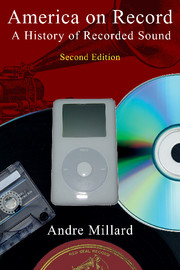Book contents
- Frontmatter
- Dedication
- Contents
- Preface to the second edition
- Preface to the first edition
- Introduction
- Part One The acoustic era
- Part Two The electrical era
- Part Three The digital era
- Abbreviations used in the notes
- Notes
- Select discography
- Select bibliography
- Subject index
- Recordings index
- Motion picture index
Introduction
Published online by Cambridge University Press: 05 February 2015
- Frontmatter
- Dedication
- Contents
- Preface to the second edition
- Preface to the first edition
- Introduction
- Part One The acoustic era
- Part Two The electrical era
- Part Three The digital era
- Abbreviations used in the notes
- Notes
- Select discography
- Select bibliography
- Subject index
- Recordings index
- Motion picture index
Summary
Recorded sound is surely one of the great conveniences of modern life. We can conjure up sounds at will from a talking machine, not just the sound of our own voices but the finest music ever made, and all with the convenience of a touch of a button. In a world oppressed by the consequences of progress, the phonograph and its descendants have provided us with cheap and plentiful distraction in the comfort of our own homes. It has made living in small, windowless, air-conditioned rooms a little easier, replacing the shared Victorian pleasures of bandstand and music hall with the solitary delight of a private world of sound.
The novelty of hearing a recording of one's voice is a little over 100 years old. In November 1877 Thomas Edison invented the phonograph in his Menlo Park laboratory, a feat which earned him worldwide fame and the nickname of “The Wizard of Menlo Park.” Although the term phonograph had been coined years before, this famous invention marked the real beginning of recorded sound technology. To the millions of Americans and Europeans who marvelled at what they thought was a great scientific achievement, Edison's phonograph perfectly represented the new machines which were changing their lives: the telephone, electric light, safety razor, street car, camera, and automobile. The phonograph provided a service which had been unimaginable to its listeners before 1877 – it was truly a modern technology.
In the late nineteenth century, it was not only inventors who looked into the future and saw a marvelous new age created by machines. In 1888 the writer and social reformer Edward Bellamy published Looking Backward, 2000—1887, a view of a future society “so simple and logical” in which many of the burdens of industrial America had been lifted. One of the features of this utopia was that the finest music was piped into homes by telephone wires from special studios where professional musicians played around the clock.
- Type
- Chapter
- Information
- America on RecordA History of Recorded Sound, pp. 1 - 14Publisher: Cambridge University PressPrint publication year: 2005



